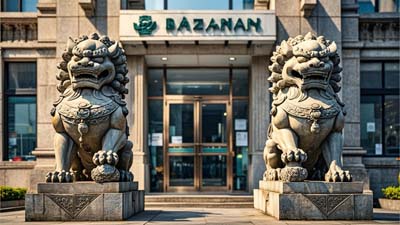Key Learning Points (Preview):
银行 (yínháng) n. bank
酒店 (jiǔdiàn) n. hotel
商店 (shāngdiàn) n. store
Whether walking through the throngs of tourists at Tiananmen Square or passing by the ornate West Gate of Peking University, these two imposing stone figures flanking the gates of many tourist destinations in China will certainly stop you in your tracks.

Known as “Fu Dogs” by many westerners, these fierce-looking animals are actually not dogs, but lions. The lions always come in pairs, one on each side of a gate or doorway and if you look closely under their majestic paws, you’ll see a globe under the male lion’s paw and a playful cub beneath the female lion’s.
Like most things in China, “石狮子 (shí shīzi) stone lions” have a long history. Visiting foreigners were the first to bring lions to China, offering them as exotic gifts to the emperor. After the introduction of Buddhism in China, lions took on a mythical role and were thought to stand for nobility and luck – perfect for guarding the emperor’s gate. In fact, the “fu” in “Fu Dogs” could either come from the word for “佛 (fó) Buddha” or “福 (fú) luck.”
Today, stone lions can be found all over China, from ancient palaces, to temples, bridges, homes, parks, and mausoleums, but just why exactly do Chinese people love these overgrown house cats so much? They’re an important representation of ancient times, as well as a symbol of luck. There are even lion dances where two people dress in a lion costume and perform with hopes to chase away evil spirits and bring about better fortune.
Here’s a few conversations that you might hear at a “银行 (yínháng) bank,” a “酒店 (jiǔdiàn) hotel,” or a “商店 (shāngdiàn) store” – each a place often watched over by “石狮子 (shí shīzi) stone lions.”
Key Learning Points:
银行(yínháng) n. bank
Scene: Exchanging Money
Dialogue 1:
Nínhǎo, wǒ yào huàn qián.
Guest: 您好, 我 要 换 钱。
Hello, I want to exchange some money.
Nín yào huàn duōshǎo?
Clerk: 您 要 换 多少?
How much do you want to exchange?
Huàn yìbǎi měiyuán.
Guest: 换 一百 美元。
100 dollars.
Qĭng nín xiān tián zhāng duìhuàndān.
Clerk: 请 您 先 填 张 兑换单。
Please fill in an exchange form first.
Hăo de.
Guest: 好 的。
OK.
酒店 (jiǔdiàn) n. hotel
Scene: Making Hotel Reservations
Dialogue 2
Nínhăo! Zhúyuán jiǔdiàn.
Receptionist: 您好! 竹园 酒店。
Hello! This is the Zhuyuan Hotel.
Nínhăo, wŏ xiăng yùdìng yíge biāozhŭnjiān.
Emily: 您好, 我 想 预订 一个 标准间。
Hello, I’d like to reserve a standard room.
Nín yào dìng nă tiān de?
Receptionist: 您 要 订 哪 天 的?
When do you want the reservation for?
Cóng bĕn yuè 15 hào dào 23 hào.
Emily: 从 本 月 15 号 到 23 号。
From the 15th to the 23rd of this month.
Hăo de.
Receptionist: 好 的。
OK.
商店 (shāngdiàn) n. store
Scene: Shopping
Dialogue 3:
Lǎobǎn, qiézi duōshǎo qián yì jīn?
Buyer: 老板, 茄子 多少 钱 一斤?
How much is half a kg.of eggplants?
Liăng kuài wŭ yì jīn.
Seller: 两 块 五一斤。
2.5 yuan for half a kg.
Wŏ yào yì jīn.
Buyer: 我 要 一斤。
I’ll take half a kg.
Chinese Culture
Chinese Popular Words (Fun Stuff)
General Chinese (Beginner Level)
General Chinese (Intermediate Level)




That is really fascinating, You’re a very skilled blogger. I’ve joined your feed and stay up for searching for extra of your fantastic post. Also, I have shared your web site in my social networks
My partner and i leaped for a while, I had been for years. More or less so I can explain the experience of your web blog. But you may be wondering what are these claims site? Your own personal! The most effective web-site We’ve at any time observed in living!
I simply want to say I am just newbie to blogging and site-building and truly liked your web blog. Likely I’m want to bookmark your website . You really come with outstanding articles. Bless you for sharing your web site.